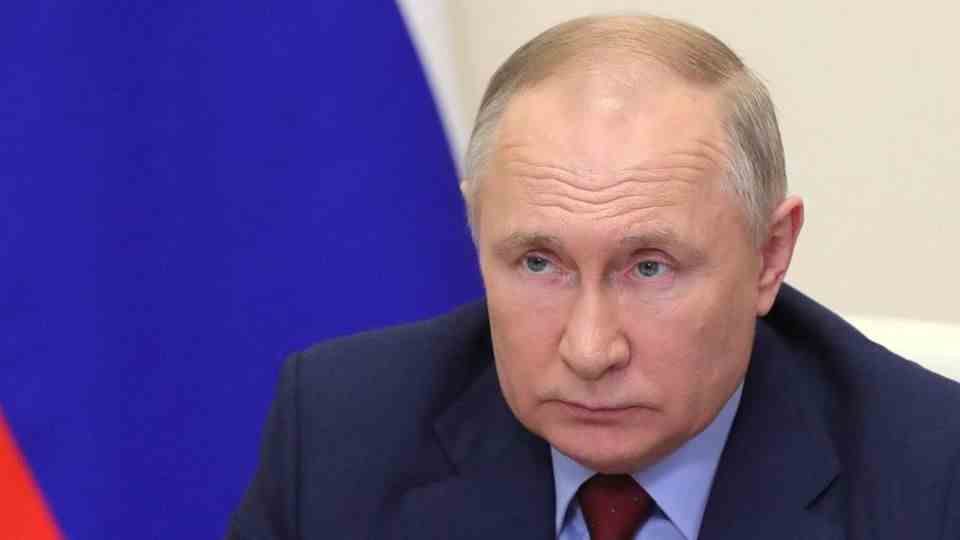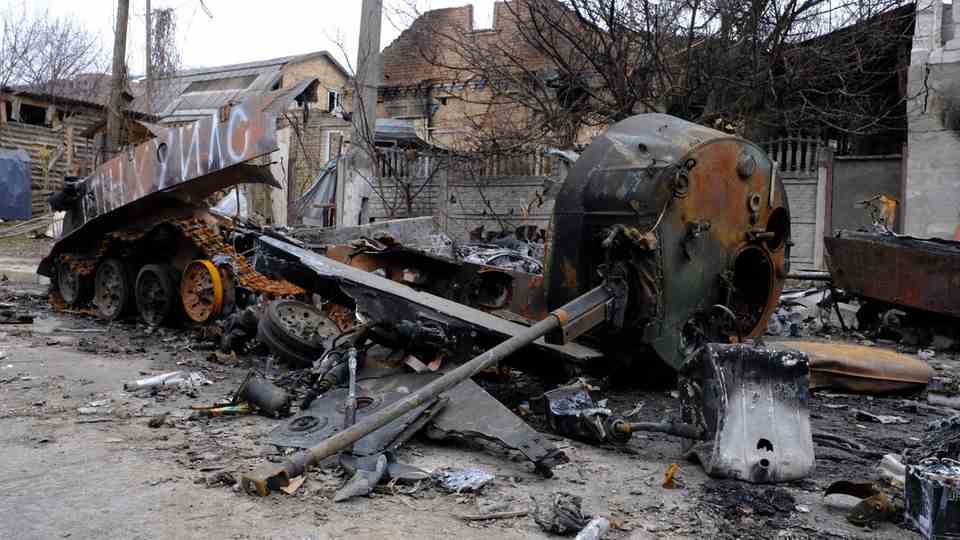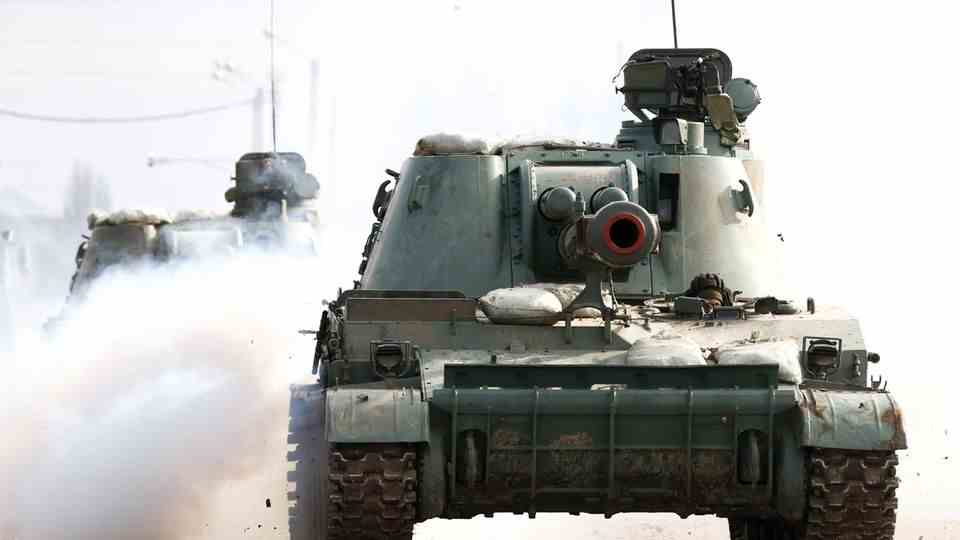Putin draws the consequences of the disastrous course of the war. His favorite general is supposed to turn the tide. A skilled tactician, Alexander Dvornikov is known for the brutality of his warfare. His trademark is the destroyed Aleppo.
The Kremlin cleans up. Apparently Vladimir Putin is informed about the disastrous course of his Ukraine campaign. He takes the consequences. And far more vigorously than one might want to admit in the West. In view of the Ukrainian resistance, it is not possible with the limited troop contingent to continue to pursue all the focal points of the first wave of attacks. Although the Kyiv and Kharkov suburbs could only be captured with heavy fighting and heavy casualties, they were abandoned within days. The battered troops are to be replenished and deployed to other sectors of the front.
end of the police operation
Press spokesman Peskov even mentioned the high losses of the Russian armed forces for the first time last week. This admission should not be greeted with glee in the West. These and other statements by the Orthodox Patriarch, for example, serve to prepare the Russian population for a tough and costly war. The Kremlin is gradually moving away from the idea of a limited “special operation.” Losses and a flood of reports of atrocities committed by Ukrainian “Nazi” soldiers – according to Moscow’s interpretation – are preparing the country for a new “Patriotic War” under the already powerful “Z” symbol. A first measure is the mobilization of 60,000 reservists. With them, one of the cardinal errors of the previous planning should be corrected. Apparently, no significant losses of the deployed troops were originally expected. After about seven days of the war, all units of the deployment were deployed. In battle they were worn out and there were no fresh forces to further fuel the offensive. It was therefore inevitable that the attack would bog down.
Putin’s favorite general
These concrete measures are accompanied by a personnel statement. Alexander Dvornikov was appointed commander in Ukraine. He is to bring momentum back into the operation and, above all, to lead the forthcoming Donbass offensive. Dwornikov became known and notorious as the Russian commander in Syria.
With Dwornikow the central supreme command is strengthened. He should ensure that the individual armies communicate better and work together. It can be assumed that the operational planning of the upcoming pincer operation in the east will be directed by him and his staff and not by the commanders of the individual spearheads. Previous operations near Kyiv, for example, had shown that the Russian armed forces had problems controlling interaction beyond brigade level. In Syria, Dvornikov commanded a very small Russian force, but even there he had to maintain communication and coordination with the forces of the ruler Assad and with allied militias.
When he appeared in Syria, the regime’s troops found themselves in the most difficult position possible, and the collapse of the Assad regime was expected in the West. But Dvornikov showed that he is a military man who “takes defeat under his boots.” This is a “good” prerequisite for taking on the disastrous Ukraine campaign.
A specialist in sieges
The appointment of Dvornikov means more than having an experienced and energetic military running the operation. It is a clear indication that the Kremlin no longer expects a lightning victory. The Ukrainian forces are defending the port city of Mariupol vigorously and resolutely – literally to the last man. Demands to surrender the city, which is still teeming with civilians, have been ignored. In this way, the defenders bind large Russian units and inflict casualties on them – even if the fight is ultimately hopeless.
Moscow apparently also expects such a scenario in other areas of eastern Ukraine. And Alexander Dvornikov is a specialist in street and house warfare – he has captured four cities in Syria. Even at the price of completely destroying them for it. “Dvornikov’s appointment is a dangerous sign that Putin has no intention of giving up on Ukraine anytime soon, but may actually try to take most, if not all, of eastern Ukraine,” said Harry Kazianis, a US military analyst of the Center for the National Interest. “Dvornikov is a shrewd tactician and strategist who will use siege warfare tactics similar to those used in Syria. My fear is that if he can’t take Dvornikov, he has orders to turn eastern Ukraine into a giant Aleppo.”
Ruthless action
In any case, Dwornikov is not a man who is held back by scruples. He gained his first experience 20 years ago in Grozny, and in 2015 and 2016 he conquered the rebel stronghold of Aleppo. Dvornikov is known as a ruthless commander. He will conduct a battle for the cities in such a way that there are as few Russian casualties as possible. His recipe for this is patience and brutality. Instead of “cleaning up” block by block, Dvornikov will focus on massive destruction, attacking the enemy from the air and with artillery. Regardless of civilians staying in the contested buildings. At the same time, within the besieged zone, he will destroy everything necessary for survival. Electricity and water supply, dressing stations, food storage and bakeries – a procedure that is already known from Syria.
In many respects the procedure resembles a medieval siege. Broken down very simply, one can say: Why storm a quarter when you can also starve the opponent? This strategy is of great importance for so-called humanitarian corridors. If they exist, they will only flow in one direction. Russia may allow civilians to leave a besieged city in convoys. Dvornikov will not allow supplies of food and medical supplies, as this will also keep the fighters alive. Another escalation would be to deliberately delay or prevent evacuations. Then the soldiers have to share the limited supplies with the civilians, so they run out faster. The suffering and death of the civilian population is also intended to break the defenders’ will to resist. A procedure that Caesar used in Alesia when he did not allow the women and children to escape and they perished between the fortress and his siege ring. In Syria, Dvornikov has bombed the cities on a large scale. There is no doubt that should Russia achieve air supremacy, he will do the same in Ukraine. It can also be assumed that he will use even more powerful weapons than before.
fear and terror
At the same time as he took office, a rocket exploded over the Kramatorsk train station in eastern Ukraine, where countless refugees were waiting for trains. 52 people died and 109 were injured. The Kremlin has of course denied the use. The attack on the railway system is not special, but the warhead used. The rocket was not designed to disable the train station and railway tracks, it was intended to kill as many people as possible. It released an exploding cloud of shrapnel that shattered an area for miles around. This explains the large number of dead and injured and the comparatively low property damage. Coincidentally or not, such an operation would suit Dwornikov, because it would break the morale of the population.
What can a general do?
History shows that the right commander can turn the tide of a battle. Besides, it’s not just about Dwornikov. There are clear signs that the hopelessly optimistic operational planning of the first weeks of the war has been completely thrown overboard and replaced by a more realistic and therefore more dangerous calculation for Ukraine. Kyiv has to fear that the extent of Russian “bungling” will be significantly lower in the future. Dwornikov can make his troops’ advances more secure and controlled. His experience in Syria can ensure that Russian losses are significantly limited, especially in the battle for cities. He can bring about coordinated operations of all branches of arms and armies. Realistic planning can also lead to solving the massive supply problems. And only sufficient supplies make the Russian form of warfare possible, which is based on massive firepower.
What he will hardly change, however, are the large gaps in the training of Russian soldiers and the misjudgments of commanders at all levels. It will be just as difficult to stop the failures caused by old material and poor maintenance in a timely manner. The Ukrainians’ will to resist will not disappear either. And also the problems that the massive arms shipments from the West are causing for the Russians. Unlike in Syria, his opponents in Ukraine are very well equipped with anti-tank weapons, man-portable anti-aircraft missiles, communications and drones. The flow of systems will increase rather than decrease. Equally crucial is the information warfare, it is obvious that the Ukrainian armed forces are being supplied with reconnaissance data and target coordinates from the West.
The frightening brutalization of war and the number of war crimes are likely to increase. Both sides flood their soldiers with reports of atrocities. It doesn’t matter whether the crimes are real or fake, these reports will massively increase the readiness for further attacks. And for the civilian population, the appearance of Dvornikov means bad things. Once the war in a region devolves into a “siege,” the suffering of civilians becomes part of the military calculation.
The next 14 days will decide
Since there is practically no reliable news about Ukrainian losses, the chances are difficult to assess. A problem for Dvornikov will be the time factor, for example if the Kremlin insists on presenting impressive successes at the victory parade on May 9th. If Dvornikov should be a signal for realistic planning on the Russian side beyond his personality, then Kyiv will no longer benefit from the amateurishness of the other side, and the dangerous phase of the war will now begin. On the Kiev side, on the other hand, it will be crucial that the population does not lose the will to fight and that equipment and weapons continue to come into the country from the West.
The next two weeks will decide this phase of the war. In the north near Kharkov and in the south, the Russians are preparing large troops to cut off the Ukrainian Donbass army from the rest of the country. Kiev’s soldiers must at all costs prevent the Russian pincers from uniting at Kramatorsk and Slowiansk. If they stop Putin’s tanks, Russia’s defeat is obvious. If the Russians break through, the Ukrainian troops in the east are lost, even if they resist for weeks.




